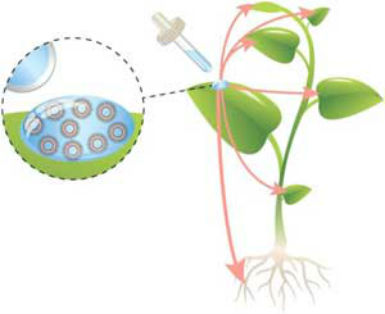|
NOVIDADES
The findings were recently published in Scientific Reports ("Therapeutic nanoparticles penetrate leaves and deliver nutrients to agricultural crops").  One-hundred nanometer liposomes were evaluated for their capacity to deliver active agricultural ingredients to fully grown crops, after being applied foliarly. The liposomes penetrated the leaves and translocated to the entire body of the plant - roots and leaves, releasing their payload inside the cells. This approach was then used to supplement plant growth and overcome acute nutrient deficiency. Credits: Nature Publishing Group
The present research, which repurposed the technology for agricultural use, was performed by the laboratory director, Assistant Professor Avi Schroeder, and graduate student, Avishai Karny. “The constant growth in the world population demands more efficient agricultural technologies, which will produce more and healthier foods and reduce environmental damage,” said Prof. Schroeder. “The present work provides a new means of delivering essential nutrients without harming the environment.” The researchers loaded the nutrients into liposomes – small spheres generated in the laboratory, comprised of a fatty outer layer enveloping the required nutrients. The liposomes are stable in the plant’s aqueous environment and can penetrate into the cells. In addition, the Technion researchers can “program” the liposomes to disintegrate and release the load at precisely the location and time of interest, namely, in the roots and leaves. Disintegration occurs in acidic environments or in response to an external signal, such as light waves or heat. Of note, the molecules comprising the particles are derived from soy plants and are therefore approved and safe for consumption by both humans and animals. In the present experiment, the researchers used 100-nanometer liposomes to deliver nutrients – iron and magnesium – into both young and adult tomato crops. They demonstrated that the liposomes, which were sprayed in the form of a solution onto the leaves, penetrated the leaves and reached other leaves and roots. Only when reaching the root cells did they disintegrate and release the nutrients. In addition to demonstrating the high effectiveness of this approach, as compared to the standard spray method, the researchers also assessed the regulatory limitations associated with the spread of volatile particles. “Our engineered liposomes are only stable within a short spraying range, up to 2 meters,” explained Prof. Schroeder. “If they travel in the air beyond that distance, they break down into safe materials (phospholipids). We believe that the success of this study will expand the research and development of similar agricultural products, to increase the yield and quality of food crops and nourish a 7-billion community of people on earth.” Technion. Posted: Jun 06, 2018. |
|||||||||||||||||||||||||